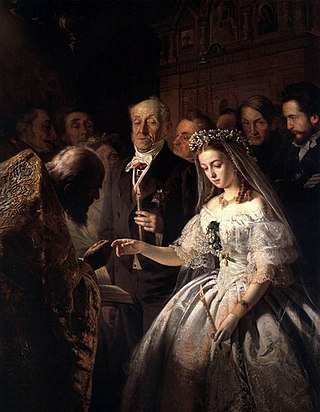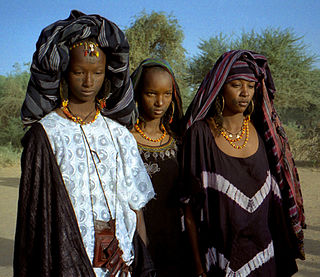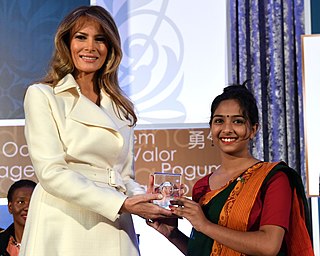Related Research Articles
Marriageable age, marriage age, or the age of marriage is the general age, a legal age or the minimum age marriage. Age and other prerequisites to marriage vary between jurisdictions, but in the vast majority of jurisdictions, the marriage age as a right is set at the age of majority. Nevertheless, most jurisdictions allow marriage at a younger age with parental or judicial approval, especially if the female is pregnant. Among most indigenous cultures, people marry at fifteen, the age of sexual maturity for both the male and the female. In industrialized cultures, the age of marriage is most commonly 18 years old, but there are variations, and the marriageable age should not be confused with the age of majority or the age of consent, though they may be the same.
Child marriage is a marriage or domestic partnership, formal or informal, usually between a child and an adult, but can also be between a child and another child.

Forced marriage is a marriage in which one or more of the parties is married without their consent or against their will. A marriage can also become a forced marriage even if both parties enter with full consent if one or both are later forced to stay in the marriage against their will.

Women in the Democratic Republic of the Congo have not attained a position of full equality with men, with their struggle continuing to this day. Although the Mobutu regime paid lip service to the important role of women in society, and although women enjoy some legal rights, custom and legal constraints still limit their opportunities.
Child marriage in India in Indian law is a marriage in which both the bride and the groom are less than 21 years of age. Most child marriages involve girls younger than 21, many of whom are from poor families.

Women in Niger are women that are from or live in the West African country of Niger. These women belong to a population in which 98% are practitioners of Islam. Laws adopted by the government of Niger to protect the rights of Nigerien women are most often based on Muslim beliefs.
Women in Somalia form a key part of Somali society, with clearly defined and important roles in the family and structure. This includes Somali women in Somaliland, a self-declared republic that is internationally recognized as an autonomous region of Somalia. From the time of Ismail Urwayni's proselytizing in 1890, until the Dervish State's defeat by British air bombardment in 1920, women in the strip of land from Jidali, Sanaag in the north, to Beledweyne in the south were referred to as Darawiishaad (plural) or Darwiishad (singular).
Somali nationality law is regulated by the Constitution of Somalia, as amended; the Somali Citizenship Law, and its revisions; and various international agreements to which the country is a signatory. These laws determine who is, or is eligible to be, a national of Somalia. The legal means to acquire nationality, formal legal membership in a nation, differ from the domestic relationship of rights and obligations between a national and the nation, known as citizenship. Nationality describes the relationship of an individual to the nation under international law, whereas citizenship is the domestic relationship of an individual and the state. Somali nationality is typically obtained under the principle of jus soli, i.e. by birth in Somalia, or jus sanguinis, born to parents with Somali nationality. It can be granted to persons with an affiliation to the country, or to a permanent resident who has lived in the country for a given period of time through grant (naturalization).

In the United States, a child marriage is a marriage in which at least one party is under 18 years of age—or the age of majority. The U.S. is the only UN member state that has not yet ratified the Convention on the Rights of the Child. Its Committee on the Rights of the Child "reaffirms that the minimum age limit should be 18 years for marriage."

Sharmin Akter is a Bangladeshi activist against child and forced marriages. She resisted her mother's efforts to get her married at the age of 15 to a 32-year-old man and fought to continue her education. A student of Rajapur Pilot Girls High School. She wants to become a lawyer to fight child and forced marriages. She is an International Women of Courage Award recipient.

Child marriage is a marriage or union between a child under the age of 18 to another child or to an adult. Child marriage is common in a multitude of African countries. In South Sudan, child marriage is a growing epidemic. Child marriage in South Sudan is driven by socioeconomic factors such as poverty and gender inequality. Current figures state that South Sudan is one of the leading countries in the world when it comes to child marriage. Child marriage has negative consequences for children, including health problems and lower education rates for South Sudanese girls. Many initiatives have been taken to combat child marriage in South Sudan, but the presence of societal norms and instability continues to drive its presence in the nation.
Child Marriage in Angola. In 2017 in Angola, 30% of girls are married off before the 18 yo. 8% are married before they turn 15.
Child marriage in Mauritania: in 2017 in Mauritania, 37% of girls are married off before they are 18 years old; 14% are married before they turn 15. Mauritania is the 19th highest nation in the world for child marriage.
Child Marriage in Togo. In 2017 in Togo, 22% of girls are married off before age 18. 6% are married before they turn 15.
Child marriage in the Democratic Republic of the Congo is the eighteenth highest in the world. In a child marriage, one or both parties are under the age of eighteen years old. In the Democratic Republic of the Congo (DRC), 37% of girls are married before they turn eighteen, and 10% of girls are married before age fifteen. Though significantly less than the rate of child marriage for girls, 6% of boys in the DRC are married before age eighteen.
Child marriage is the betrothal of girls and boys below the age of 18.
UNICEF's Early Marriage: A Harmful Traditional Practice report characterizes child marriage as a harmful institution that often exposes young women in developing nations to damaging domestic, health, and sexual conditions. The report also highlights the practice as a human rights violation. In World Vision's "Before She's Ready: 15 Places Girls Marry by 15", the organization highlights the socioeconomic consequences of child marriage on girls, noting that many girls are forced to stop their schooling as a result of their marriages. With the denial of education, girl brides are often not able to make income as adults or become politically active citizens.
Events in the year 2020 in Somalia.

Feminism in Indonesia refers to the long history of discourse for gender equality to bring about positive social change in Indonesia. The issues women in Indonesia currently are facing include gender violence, underage marriages, and lack of representation in the political system. Feminism and the women's right movement began during colonial Indonesia under Dutch rule and were spearheaded by the national heroine Kartini, a Javanese noblewoman who advocated for the education of all women and girls regardless of social status. In the early 19th century, women's rights organizations and movements were allowed to developed under Budi Utomo, the first Indonesian Nationalist organization. Modern day Indonesian feminism include and are influenced by both fundamentalist and progressive Islamic women's organizations.
References
- ↑ Govt. Somalia, UNFPA (30 April 2020). "The Somali Health and Demographic Survey 2020". reliefweb.int.
- ↑ "Child marriage around the world: SOMALIA", Girls Not Brides
